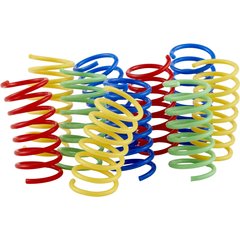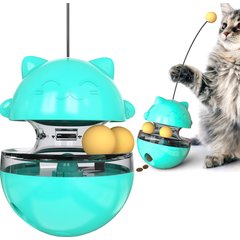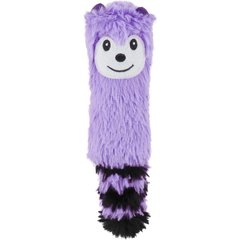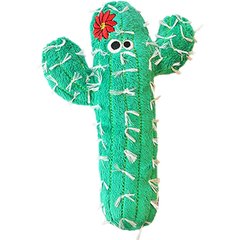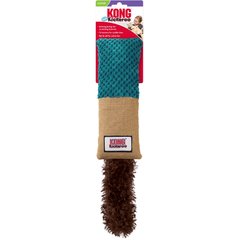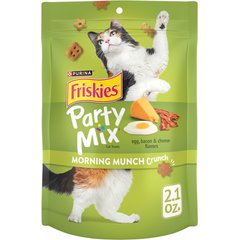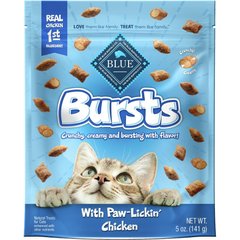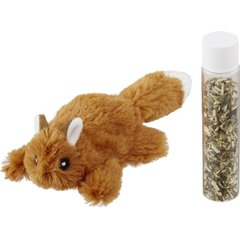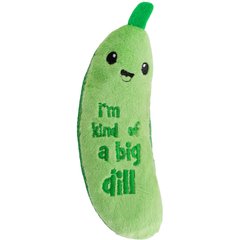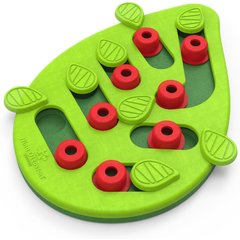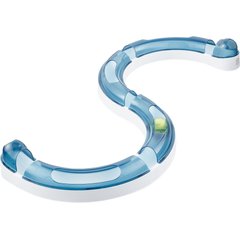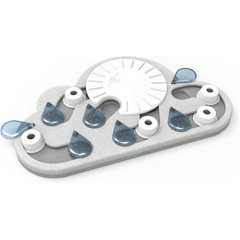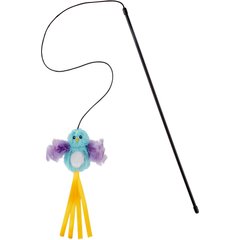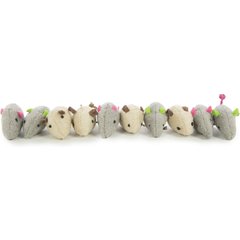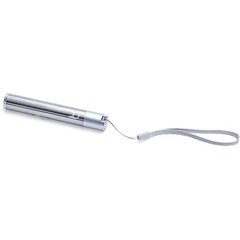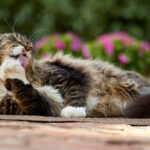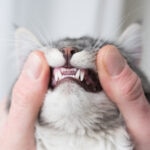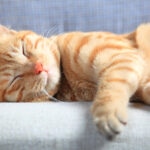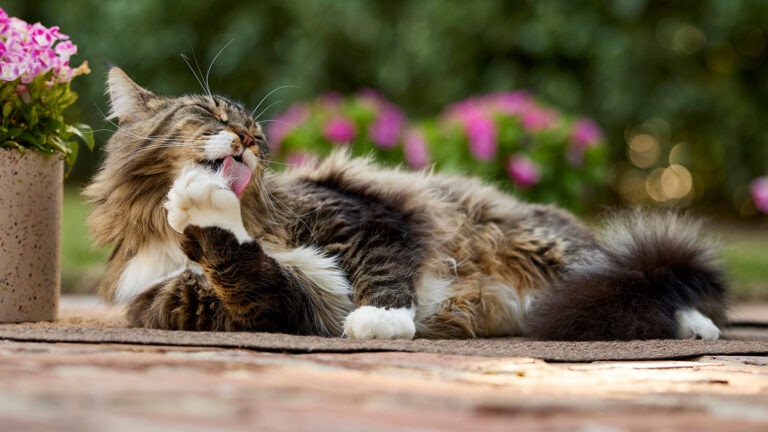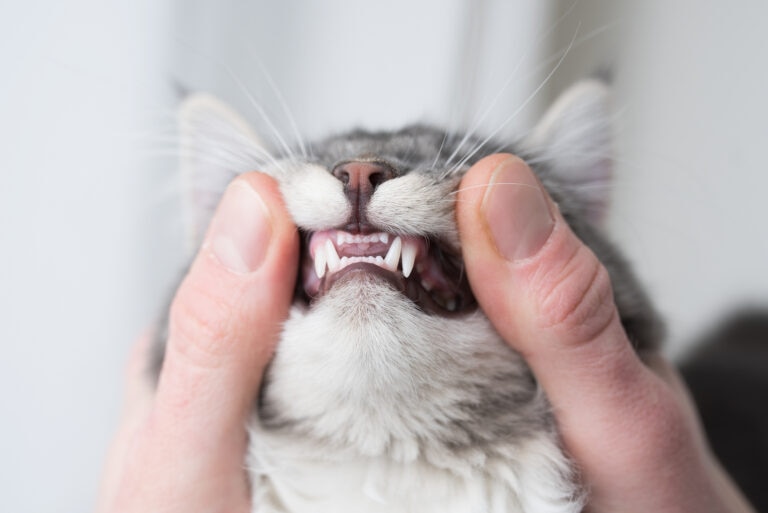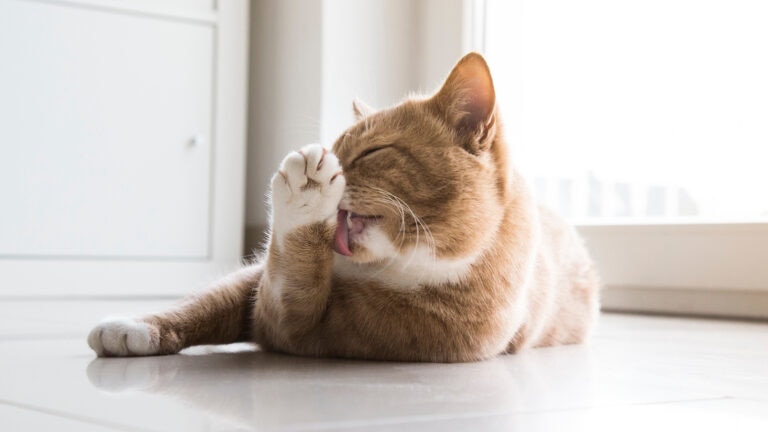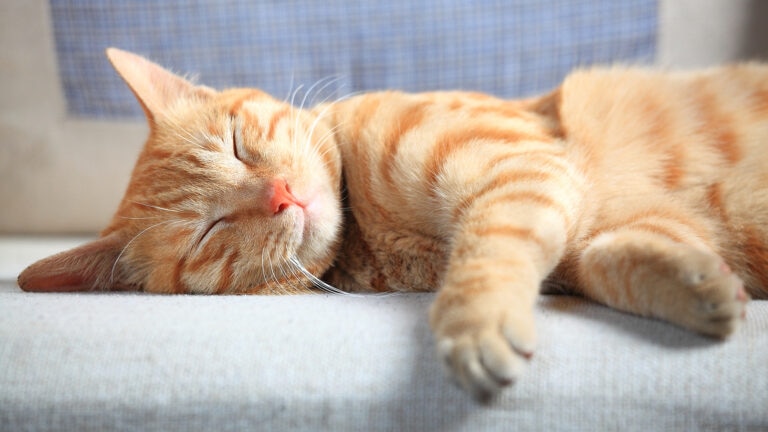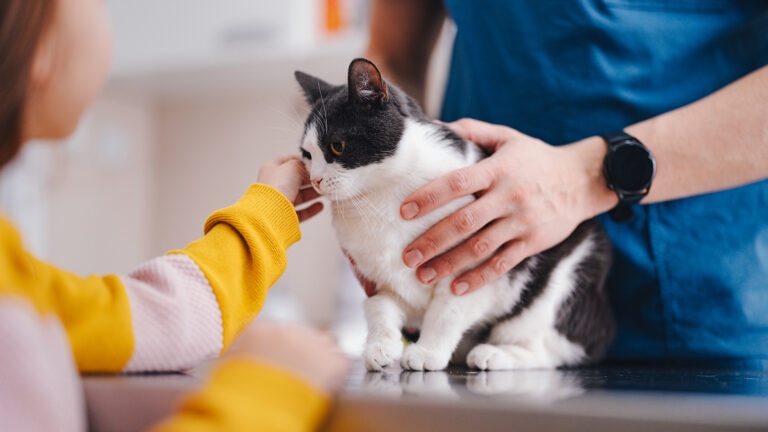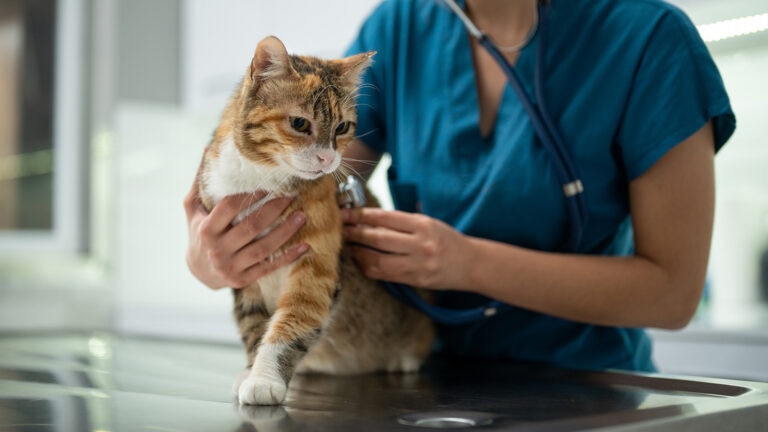How To Play With Your Cat
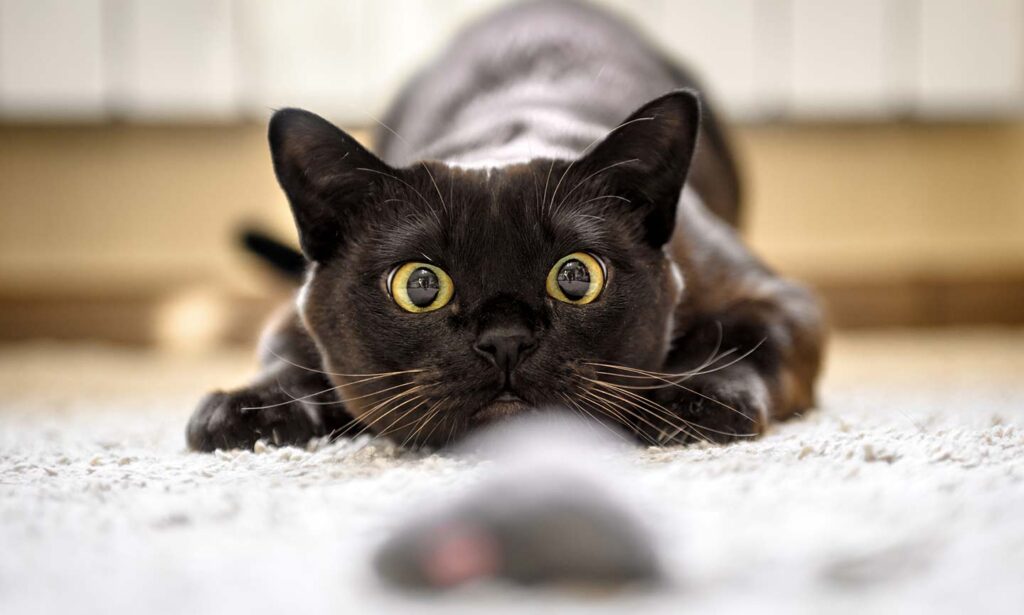
Photo by scaliger/iStock / Getty Images Plus
Playing with your cat isn’t simply fun—it can also help keep your companion happy and healthy, and strengthen the bond you share. From the oldest tricks in the book to the hottest new toys on the market, we asked Steve Dale, a Chicago-based certified animal behavior consultant (CABC); and Gwendolyn Mathers, executive director for Tail Town Cats, which operates Tail Town Cat Café and Adoption Center in Pasadena, California, for their top tips and favorite products. Ready, set, play!
6 Fun Ways To Play With Your Cat

Moyo Studio/E+
1. Hunting
For your cat, “playing” and “hunting” are one and the same.
“Of course, cats hunt in the wild to eat and survive, but all of their play—at home and in nature—is simulated hunting,” says Mathers. “Kittens stalk each other, chase, pounce, bite, kick—all parts of taking down prey for dinner.”
To engage your cat’s natural hunting instincts, your job is simple: engage your cat’s prey instincts. Easy ideas include:
- Dangle a feather wand toy and flick it around quickly to mimic a flying bird
- Toss toy balls or cat springs, and let your cat chase them as they bounce
- Crumple paper bags and toss them around the room
- Buy toy mice with bells or rattles inside, and fling them across the floor
- Provide food-dispensing toys and puzzle toys for independent play
Recommended Products
2. Wrestling
In addition to catching “prey,” cats like wrestling with it. If your cat likes to wrestle and “bunny-kick” your arm, consider investing in a kicker toy.
“A kicker toy will save your hands,” says Mathers. Shake it in front of your cat so they grab for it, or place it into their grip so they start wrestling with it.
To keep your cat’s attention and pique their predatory instincts, grab the toy and shake it as if it’s trying to get away.
Recommended Products
3. Foraging
Cardboard boxes can provide hours of entertainment for curious kitties. For a fun game of hide-and-seek, all you need are packing materials and a handful of cat treats.
“It’s no surprise that empty cardboard boxes are a favorite for most cats,” says Mathers. “Cats love to dig through the packing paper, so try hiding some treats at the bottom to create an enriching activity.”
Recommended Products
4. Catnip
Looking to spice up playtime? Many cats go wild for catnip. Add some catnip-stuffed toys to playtime, or make your own by filling a kid-size crew sock with loose-leaf catnip and tying the end in a knot, Mathers says.
Stale catnip loses its magic, so be sure to refill with fresh catnip if possible. Toys that aren’t refillable can still be freshened up, adds Mathers. “Dry-marinate them in a Ziploc bag with fresh or dried loose-leaf, organic catnip,” she says. “The smell will be fresh, intense, and it will keep your toys exciting.”
Recommended Products
5. Clicker Training
Training isn’t just for dogs: Just like pups, cats can be taught to do tricks, and they benefit from the mental stimulation from training. Clicker-training is a popular method, says Mathers.
“Cats can learn lots of tricks, like fetching and high-fiving,” she says. “Start small and work your way up to more complicated tricks.”
In addition to patience, you’ll need tasty cat treats. While some cats may perform for praise, high-value snacks are extra motivating.
6. Treat Puzzles
Just like training, “solving” food puzzles provides important mental stimulation for cats. There are plenty of interactive toys on the market, but you can also make your own with common household items, says Mathers.
“Treat puzzles can be made out of a shoe box and empty toilet paper rolls standing on end,” she says. “With tubes up, drop treats inside to get the cats to reach in and search for snacks or kibble.”
Recommended Products
Why Is Play Important?
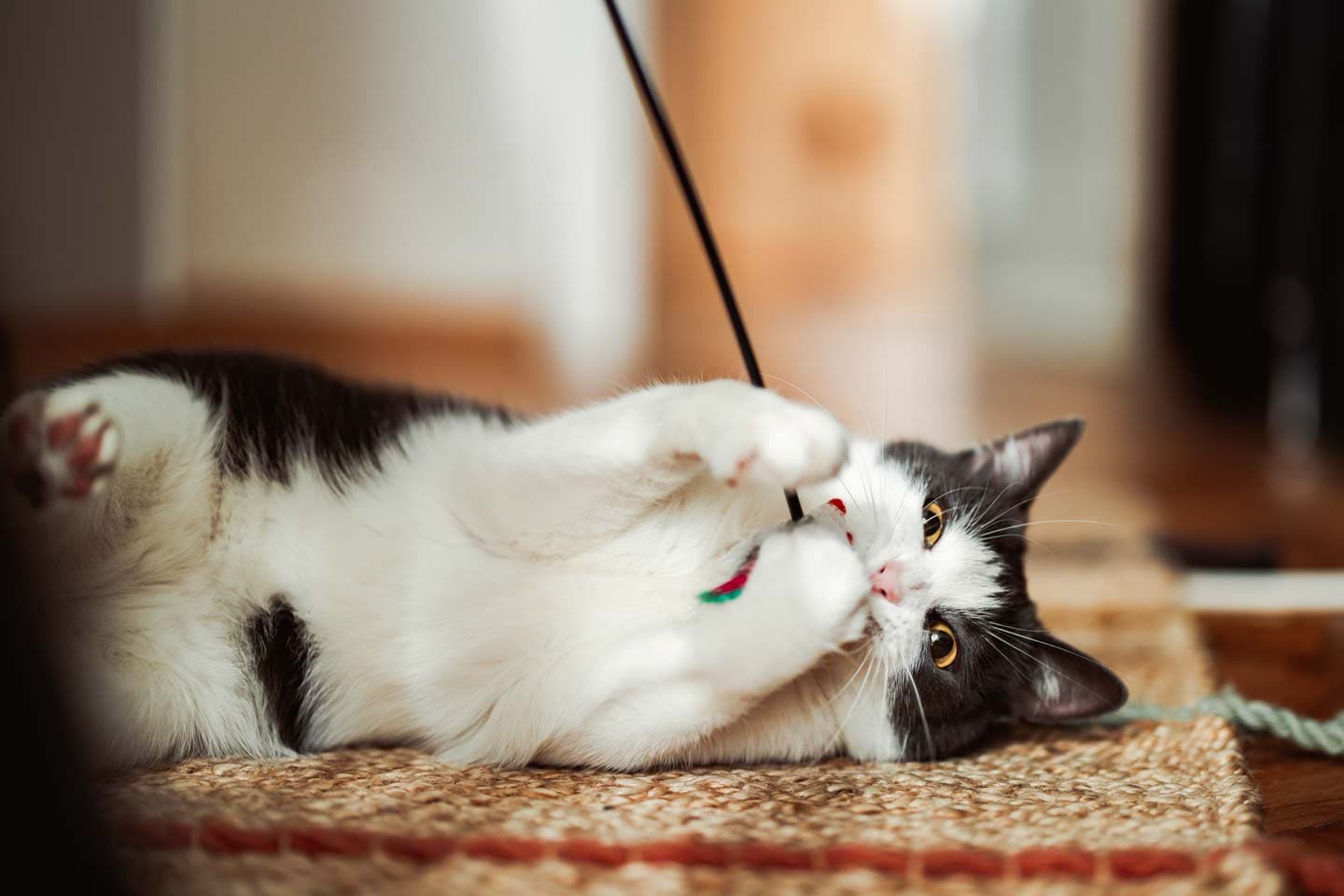
miniseries/E+
Playing isn’t just fun and games: Engaging, interactive play sessions offer important physical and mental stimulation to your feline friend.
“Indoor cats require stimulation—and ‘require’ is the operative word here,” says Dale. “It ought to be a law: Play with your cat at least once daily.”
Benefits of play include:
- Weight management: “Play burns calories,” says Dale. According to the Association for Pet Obesity Prevention, 61% of cats are overweight or obese, Dale adds, “which leads to a potential myriad of medical issues.”
- Fewer behavior problems: “A cat who is chasing and catching appropriately after a toy isn’t doing something we don’t want, like pulling down the blinds or knocking valuables off a table,” says Dale. “And after playtime, often cats do what they do best: catnap.”
- Bonding: “Cats seem to associate the good time with the person at the other end of the toy, therefore enhancing the bond,” says Dale.
- Mood boosts: “We know that cats enjoy it when their prey drive kicks in,” says Dale. During playtime, “Positive endorphins are doing a happy dance in the kitty brain.”
- Healthy aging: “Movement is the best defense against aging for humans, dogs and cats,” says Dale. “Even geriatric cats are still cats and maintain their prey drives.”
6 Best Cat Toys Recommended by Experts
What constitutes the best cat toys will depend on your cat and their personal preferences. Below are a few toys and toy types that our experts recommend.
1. Cat Dancer
This top-rated wand toy is popular among felines and cat parents alike. Both Dale and Mathers recommend the Cat Dancer® Cat Charmer, which can be easily flicked through the air (it’s a bird!) or dragged across the ground (it’s a mouse!) for an enticing play session.
Recommended Product
2. Yeowww! Catnip Toys
Not all catnip toys are created equal. For a superior play session, Mathers recommends Yeowww!® toys, which are extra durable and filled with potent, 100% organic ‘nip. “Yeowww! has some extremely strong catnip toys, with no stuffing or filling,” she says. “So, if the cat were able to rip it open, there would be no danger of the stuffing being consumed.”
Recommended Product
3. Feather Wands
They’re not quite birds, but feather wands can come close in the right hands. Select a wand with bright, fluffy feathers. If it has ribbons and bells, even better. “Try to mimic a prey animal in nature,” says Mathers. “Get the wand toy up in the air, whooshing around like a bird. A little wiggle and whisk-away is a great move to get your cat chasing a wand or fishing pole toy.”
Recommended Product
4. Furry Mice
Furry toy mice, like SmartyKat® Skitter Critters™, are feline forever-favorites. For the most entertainment, Mathers suggests looking for mice toys that also have bells or noisemakers in them. (After all, real mice make noise!)
Recommended Product
5. Crinkle Toys
Sound can be an exciting part of the “hunting” experience, Mathers says. “Since their play is all about hunting, think about toys in terms of prey,” she says. “What is similar about what they would hunt in nature, and what it can mimic? Is it a bird in flight? Or a crinkling bug? Many cats love the sound of crinkling.”
For that satisfying crinkle sound, Mathers suggests Mylar® balls. Simply toss them and let your kitty go wild.
Recommended Product
6. Laser Pointers
Laser pointers are classic cat entertainment, and for good reason: That sneaky red dot is irresistible! When playing with a laser pointer (or any teaser toy), remember to let your cat “catch” their “prey.” “When you do, you might even want to drop some treats,” Dale says. “Never, ever being able to catch a thing is likely frustrating.”
Recommended Product
More Tips for Playing With Cats
Great play sessions are interactive, engaging, and safe. Consider these tips for superior kitty entertainment:
- Start slow: Not all cats will go bouncing off the walls at the sight of a feather wand. Older cats, overweight pets, and those not used to being active might need to ease in first. “Starting slow just to get the cat interested is a good start,” says Dale. “Overweight or obese cats aren’t going to go flying through the air, but it’s important they play too. Just have realistic expectations.”
- Provide a variety of toys: Every cat is unique, so offer a range of toys to find your cat’s favorites. And remember, their tastes can change—so that fishing rod toy they didn’t like today might be fun next week.
- Short is sweet: Play with your cat in short-burst play sessions throughout the day. “Unlike some dogs who may play with a tennis ball forever, cats are not marathon players,” says Dale. “Their ideal could be two or three 10-minute sessions a day, or maybe three-minute sessions during commercials. Cats generally don’t benefit when the game goes 30 minutes, even if they are willing—which most cats are not.”
- Rotate toys: To keep toys new and exciting, store them when not in use, and consider rotating them. “Cats may get bored of certain toys, so I like to cycle my cat’s toys out,” says Mathers. “Put some away, and pull out a few at a time. When those start to get ignored, bring out the old ones again, and they’ll seem new and interesting again.”
- Supervise toys with choking hazards: Ribbons, feathers, and small parts can be dangerous if ingested. “Always be careful about toys that can be easily torn apart or have pieces that can be ingested,” Mathers says. “I only leave out toys like balls, spinners, and springs that would be impossible to eat, and save the high-value toys for supervised playtime.”
- Pay attention to body language: If your cat is pouncing, swatting, and begging for more, play on! But if your feline friend retreats, hides, or curls up for a nap, put the toys away. That’s their way of saying, “Let’s play later.”
